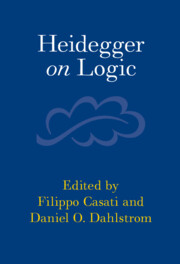Book contents
- Heidegger on Logic
- Heidegger on Logic
- Copyright page
- Contents
- Contributors
- Acknowledgments
- Method of Citation
- Introduction
- Part I Normativity, the Phenomenology of Assertions, and Productive Logic
- Part II Language, Logic, and Nonsense
- Part III Paradox, the Prospects for Ontology, and Beyond
- Chapter 7 Heidegger, Being, and All That Is and Is So
- Chapter 8 Logic and Attunement
- Chapter 9 Heidegger and the Authority of Logic
- Chapter 10 On the Limits and Possibilities of Human Thinking
- Part IV Logical Principles and the Question of Being
- References
- Index
Chapter 7 - Heidegger, Being, and All That Is and Is So
On Paradoxes, and Questions, of Being
from Part III - Paradox, the Prospects for Ontology, and Beyond
Published online by Cambridge University Press: 15 September 2022
- Heidegger on Logic
- Heidegger on Logic
- Copyright page
- Contents
- Contributors
- Acknowledgments
- Method of Citation
- Introduction
- Part I Normativity, the Phenomenology of Assertions, and Productive Logic
- Part II Language, Logic, and Nonsense
- Part III Paradox, the Prospects for Ontology, and Beyond
- Chapter 7 Heidegger, Being, and All That Is and Is So
- Chapter 8 Logic and Attunement
- Chapter 9 Heidegger and the Authority of Logic
- Chapter 10 On the Limits and Possibilities of Human Thinking
- Part IV Logical Principles and the Question of Being
- References
- Index
Summary
A number of readings of the work of Martin Heidegger have emerged recently that place at its heart what has been labeled a "paradox of being." We find these readings in the work of Filippo Casati, Adrian Moore, Graham Priest, and Edward Witherspoon, though related themes can be traced earlier in work by Daniel Dahlstrom. The approach that these readings take poses new and interesting questions of Heidegger’s texts – some of these commentators arguing, for example, that the paradox they identify calls for a radical change in our understanding of logic – as well as contributing to a revival of interest in "the question of being." This chapter argues that these readers are right to point to a "paradox of being" in Heidegger’s work and to stress the importance of that "question"; but it raises questions about how they do this. The first half of the chapter examines critically the "paradox of being" that these readings identify, and the basis upon which they believe it rests. The second half of the chapter argues that a "paradox of being" does indeed emerge in Heidegger’s work, but it is rather different in character, is more pressing – because it rests on sounder foundations – and becomes visible only when we examine more closely precisely which "question of being" it is that is at stake in Heidegger’s work.
- Type
- Chapter
- Information
- Heidegger on Logic , pp. 133 - 158Publisher: Cambridge University PressPrint publication year: 2022
- 2
- Cited by

